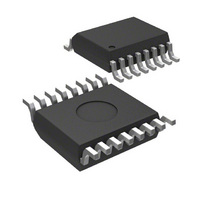MIC74BQS Micrel Inc, MIC74BQS Datasheet - Page 11

MIC74BQS
Manufacturer Part Number
MIC74BQS
Description
IC I/O EXPANDER I2C 8B 16QSOP
Manufacturer
Micrel Inc
Series
-r
Datasheet
1.MIC74YQS.pdf
(18 pages)
Specifications of MIC74BQS
Interface
I²C, SMBus
Number Of I /o
8
Interrupt Output
Yes
Frequency - Clock
-
Voltage - Supply
2.7 V ~ 3.6 V
Operating Temperature
-40°C ~ 85°C
Mounting Type
Surface Mount
Package / Case
16-SSOP (0.154", 3.90mm Width)
Includes
-
Lead Free Status / Rohs Status
Contains lead / RoHS non-compliant
Application Information
Bit Transfer
The data received on the DATA pin must be stable
during the high period of the clock.
Data can change state only when the CLK line is low.
Refer to Figure 3.
Start and Stop Conditions
Two unique bus situations define “start” and “stop”
conditions. A high-to-low transition of the DATA line
while CLK is high indicates a start condition. A low-to-
high transition of the DATA line while CLK is high
defines a stop condition. See Figure 4.
Acknowledge and Not Acknowledge
The acknowledge related clock pulse is generated by the
master. The transmitter releases the DATA line (high)
during the acknowledge clock cycle.
In order to acknowledge (ACK) a byte, the receiver must
pull the DATA line low during the high period of the clock
pulse according the bus timing specifications. A slave
device that wishes to not acknowledge a byte must let
the DATA line remain high during the acknowledge clock
pulse. See Figure 6.
Micrel, Inc.
October 2006
DATA
Figure 3. Acceptable Bit Transfer Conditions
CLK
DATA
CLK
Start
Data Change Allowed
MSB
1
Data Stable,
Data Valid
2
3
4
Figure 5. Serial Byte Format
5
6
7
LSB
8
ACK
11
9
Start (S) and stop (P) conditions are always generated
by the bus master (host). After a start condition, the bus
is considered to be busy. The bus becomes free again
after a certain time following a stop condition or after
both CLK and DATA lines remain high for more than
50µs.
Serial Byte Format
Every byte consists of 8 bits. Each byte transferred on
the bus must be followed by an acknowledge bit. Bytes
are transferred with the MSB (most significant bit) first.
See Figure 5.
(Slave MIC74)
1
Byte Complete
2
Figure 6. Acknowledge and Not Acknowledge
(Host)
DATA
DATA
DATA
3
CLK
CLK
4
Figure 4. Start and Stop Definitions
5
Start
6
7
MSB
1
8
ACK
2
9
3
4
StoP
5
6
7
LSB
8
M9999-101006
StoP
ACK
9
NAK (high)
ACK (low)
MIC74









